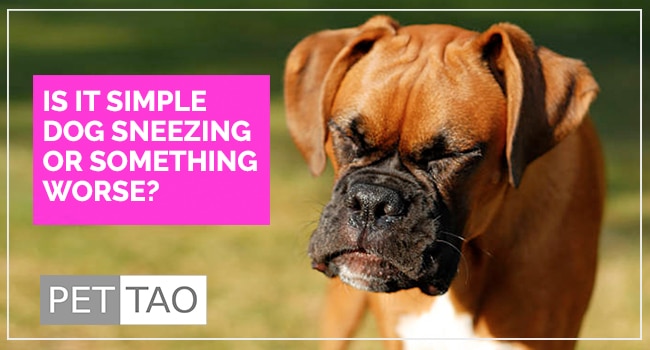Buffy sneezed three times in the exam room.
“Gesundheit!” remarked Mrs. Jones in a deep German accent.
“Ever since the weather changed, Buffy has been sneezing constantly. She seems miserable,” Mrs. Jones explained.
Dogs sniff and smell everything and sneeze as a result.
Likewise, occasional sneezing is a normal occurrence and an efficient way of eliminating foreign material trapped in the nasal passages.
However, when sneezing is excessive, a more serious problem may be present.
Most commonly, dog sneezing fits are due to canine allergies, kennel cough or nasal foreign bodies, all relatively benign maladies.
Sometimes though, a dog sneezing a lot indicates a more dire situation.
4 Serious Causes of Dog Sneezing
Disease #1: Oro-Nasal Fistula
Especially common in middle-aged to older dogs, an oronasal fistula is an opening between the oral and nasal cavities.
Debris travels from the oral cavity to the nasal cavity and causes dog sneezing fits.
This malady is easily diagnosed by finding the tract or tunnel which is usually adjacent to the upper canine tooth.
However, anesthesia is required to identify the suspected problem.
Disease #2: Nasal Neoplasia
Cancer of the nose is most commonly reported in dogs between 8 and 10 years of age.
Common clinical signs are:
- Persistent nasal discharge
- Sneezing
- Intermittent nose bleeding
X-rays and tissue biopsy are necessary for an accurate diagnosis.
Antibiotics fail to control the infection.
80% of nasal tumors are malignant.
Adenocarcinoma and squamous cell carcinoma are the most common tumor types.
Disease #3: Mycotic Rhinitis
Refers to fungal growth in the nasal cavity.
Mycotic rhinitis disease is extremely difficult to diagnose and differentiate from nasal cancer.
Persistent and voluminous mucoid nasal discharge, sneezing, and nasal pain is common symptoms.
Erosion of the external nares is an important physical finding.
Discharge is NOT responsive to antimicrobial treatment.
Mycotic rhinitis is generally a disease of younger dogs with 40% of cases occurring in dogs 3 years or younger and 80% of cases in dogs 7 years and younger.
The diagnosis is uncommon in brachycephalic breeds.
Localized Aspergillus fumigatus is the most commonly reported fungus isolated.
Disease #4 Lymphoplasmacytic Rhinitis
The poorly described clinical syndrome associated with chronic sneezing and nasal discharge (bilateral or unilateral).
Affected dogs are typically young to middle-aged, large breed dogs.
Signs are NOT usually responsive to either antibiotics or steroids (topical or systemic).
Diagnosis is based on ruling out other causes and nasal biopsy.
Learn more about how to keep your dog healthy!
Powerful Tools for Overcoming Dog Allergies
- Learn more about dog allergies.
- Switch to a Limited Ingredient Diet. PET | TAO Limited Ingredient Diet is naturally low in foods that stimulate an allergic response.
- Supplement with medicinal mushrooms. PET | TAO Complement Immune Supplement is a Mushroom Blend for easing inflammatory response and ease allergy symptoms.
- Try digestive enzymes and probiotics. PET | TAO Harmonize GI boosts gut health and combats food allergens.
- Feed Freeze Dried Lung Treats. According to TCVM, Lung is on the same meridian as the skin. Therefore, lung treats help both breathing and skin allergies. Lung treats support lung and skin similar to a glandular supplement in a “like treats like” fashion.
- Learn more about TCVM Herbal Remedies. Chinese medicine offers many amazing natural solutions for dog allergies Some good examples are:








